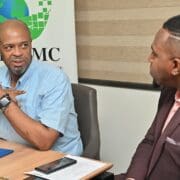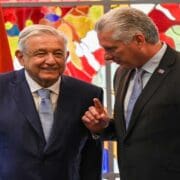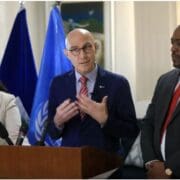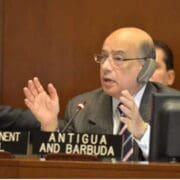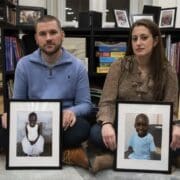Black Immigrant Daily News
Bryan and Julie Hanlon hold photos of their adopted Haitian children, Gina, left, and Peterson, in a play area of their home in Washington, Tuesday, Feb. 7, 2023. They became the legal parents of the siblings in 2022 and fear they won’t be able to secure their passports and fly them out of Haiti. (AP Photo/Cliff Owen)
Dozens of children are stuck in orphanages across Haiti, unable to leave the increasingly volatile country and start new lives with adoptive parents because a U.S. policy change has unleashed a rush for passports at Haiti’s main immigration office.
U.S. President Joe Biden announced last month that the U.S. will accept 30,000 people a month from Haiti, Nicaragua, Cuba and Venezuela if they pass a background check and have an eligible sponsor and a passport to travel.
The ensuing demand for Haitian passports has overwhelmed Haiti’s passport office in the capital, Port-au-Prince, where people with appointments cannot squeeze through the aggressive crowd or secure new appointments.
Meanwhile, adoptive parents say the U.S. State Department has declined to grant passport waivers as they worry their children will succumb to hunger, cholera or gang violence.
“It’s infuriating,” said Bryan Hanlon, a postal inspector who lives with his wife in Washington.
They became the legal parents of Peterson, 5, and Gina, 6, last year and fear they won’t be able to secure passports for the children and fly them out of Haiti, which has been in a downward spiral since the July 2021 assassination of President Jovenel Mo?se.
Last year, the number of reported kidnappings in Haiti soared to 1,359, more than double the previous year, and 2,183 killings were reported, up by a third from 2021, according to the United Nations. Gangs also are raping women and children at an alarming rate, including those as young as 10, officials say.
More than 1 million children are not going to school as a result of social unrest and other issues, with 72 schools reporting violent attacks since October, compared with only eight during the same time period the previous year. Armed groups have attacked more than a dozen schools and set one on fire, and they also have killed one student and kidnapped at least two teachers, according to UNICEF statistics released Thursday.
Haiti also is fighting a deadly cholera outbreak and a spike in starvation.
Last year, 5-year-old Peterson became malnourished and had to be taken to a clinic, where he was treated for a couple of months.
Then in October, the siblings had to flee the orphanage with a caretaker as gangs raided the neighborhood, killing dozens of civilians and setting homes on fire. The violence that erupts as gangs fight over territory has left tens of thousands of Haitians homeless.
“That was the worst day of our lives,” Hanlon said. “We didn’t know if they were alive or dead.”
With their orphanage abandoned because of the violence, the children had been taken by one of their caretakers to her home in southern Haiti, where they have remained, he said.
Hanlon said he and his wife send money to the caretaker, but that “some days, there is just no food to buy or no fuel to cook it.” Other times, she cannot leave the house to pick up the money because it’s too dangerous, he said.
Brooke Baeth, an elementary school speech therapist in Minnesota, understands the fear and frustration. She and her husband became the legal parents of a 5-year-old girl in Haiti nearly a year ago, but they don’t know when they will be able to meet her.
In late January, her daughter and caretakers flew from their orphanage in northern Haiti to Port-au-Prince only to encounter a huge crowd at the immigration office. Despite having an appointment, they could not get inside, nor could some of the office’s own employees, Baeth said.
“It’s just devastating,” she said, adding that like the Hanlons, they haven’t been able to obtain a passport waiver from the State Department. “It feels like our voices are not being heard.”
A spokesperson for the State Department said intercountry adoption is one of the agency’s highest priorities and that it uses all appropriate tools to identify and overcome barriers.
“We understand that it is currently difficult for prospective adoptive parents to obtain a Haitian passport,” the spokesperson said. “We remain committed to helping prospective adoptive parents navigate the often-complicated journey of intercountry adoption. We will continue to engage with the Haitian government on this issue.”
Hanlon noted they are the legal parents of Gina and Peterson, not prospective adoptive parents.
He shared email messages with The Associated Press in which the U.S. government denied his request for a waiver by noting that both Haiti’s immigration office and the Ministry of the Interior were open for business, and that passport waivers are for use only on a case-by-case basis and as a last resort.
Ryan Hanlon, president and CEO of the U.S. National Council for Adoption who is not related to Bryan Hanlon, said in a phone interview that the State Department’s manual calls on officials to prioritize adoption cases.
“Can we even say we prioritize adoption when we have legal options that we choose not to utilize?” he said. “It’s the safety of the children that’s the concern here.”
Given the ongoing crush at Haiti’s main immigration office, government officials recently opened two makeshift offices in a gymnasium and a soccer field elsewhere in Port-au-Prince. They also implemented a schedule setting aside specific days for groups including women and the elderly. Saturdays have been reserved for children.
Officials say they don’t know how many Haitian children are in this situation, but two of 11 U.S. agencies that are main providers of adoption services in Haiti say a dozen or more of their children are affected and the number has been rising. From 2016 to 2020, people adopted 827 children from Haiti, according to the most recent statistics from the State Department. Only 96 children were adopted in 2020, down from a high of 227 in 2017.
At one adoption agency, Colorado-based A Love Beyond Borders, at least 13 children in Haiti have been adopted but have been unable to obtain passports amid a processing backlog that is growing every day, said Stephanie Thoet, the agency’s Haiti program coordinator.
She noted that even Haiti’s Ministry of the Interior has been unable to access the passport office to manually deliver the files of adopted children and worries about officials being killed or kidnapped by gangs as they travel back and forth with paperwork that has taken years to complete.
“I am terrified every time they go,” she said.
At another agency, Utah-based Wasatch International Adoption, at least a dozen children who already have been adopted can’t obtain a passport, and the number is growing, said Chareyl Moyes, the agency’s Haiti program manager.
“The situation is dire,” she said, adding that she worries about a child or caretaker being killed. “Do we want to wait until it’s at that point?”
Baeth said it’s hard for her daughter to understand why it’s taking so long to be together. They tell her how much she means to them and send her images of the snow, prompting her to excitedly ask if she could eat it. The girl, who wants to be a unicorn rider when she grows up, has sent them videos of her doing cartwheels and somersaults.
Hanlon said his daughter knows what is going on: “She understands enough to be frustrated.”
He recalled how Gina was upset one day and told her caretaker: “I don’t want to talk to them in videos anymore. I want to talk to them in person.”
His son, however, is younger.
Hanlon said when the boy is told he can’t travel to certain parts of Haiti, he tells the other children not to worry, assuring them: “My dad’s like Superman. He’ll fly down and kill the bad guys.”
Hanlon paused as his voice broke.
“Some days, I feel like I’m letting him down.”
Donate At Caribbean News Service, we do not charge for our content and we want to keep it that way. We are seeking support from individuals and organisations so we can continue our work & develop CNS further.
NewsAmericasNow.com


